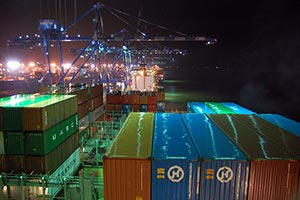Shipping Technology Startups May Get Boost From Hanjin Woes

SINGAPORE — The global shipping industry, ravaged by collapsing revenues, defensive mergers and the failure of major player South Korea's Hanjin Shipping Co. slowly is waking up to the redeeming potential of technology.
While sensor-laden containers, smart ships and 3D printing have grabbed the headlines, the startups making the biggest inroads are those working on something more basic — streamlining the interaction among shippers, freight forwarders and those actually transporting the goods.
"This is way up there on the list of insanely complex systems with enormous impact on the global economy," said Trae Stephens of Founders Fund, which this week led a $65 million investment round in Flexport, a startup focusing on providing logistics services and data.
RELATED: McLeod CEO sees opportunities in ‘uncertain times’
"We believe doing this in a more efficient way can really move the needle on every part of the economy," said Stephens, who will join Flexport's board as part of the investment round.
Container ocean trade is likely to grow no more than 3% over the next few years — at a compound annual growth rate — compared to 10% in 2000 to 2005 and 5% in 2005 to 2010, according to Seabury, a transportation consultancy, and McKinsey predicts shipping oversupply will stay above 20% this year and next.
Zvi Schreiber, CEO of Freightos, a Hong Kong startup that offers Expedia-like quotes for end-to-end freight shipping, says the shipping industry is "manual, inefficient and opaque."
RELATED: Hanjin clients report price-gouging, container pileups
KPMG found that a quotation for shipping freight typically involved 20 associated fees and, according to the Journal of Commerce, shippers each lose up to $150,000 a year when price volatility and staffing cuts force invoicing errors.
"This industry is broken, there's no question we have a serious issue," Jesper Kjaedegaard, partner at shipping and logistics firm Mercator International, said at a recent shipping conference in Singapore. "Without technology, this industry is not going to move much further."
Kjaedegaard pointed to startups such as Xeneta, set up by two industry veterans after they failed to persuade their employer, shipping giant Kuehne + Nagel, to introduce greater transparency into rates charged.
RELATED: Freightos acquires WebCargoNet to expand instant freight quotes
"Transparency is viewed by a lot of people in the industry as destructive in that it would negatively affect margins," co-founder Thomas Sorbo said.
Xeneta's solution was drawn from the world of consumer startups: Encourage all those in the industry to contribute rates, creating a crowdsourced database of some 17 million contracted sea-freight rates worldwide.
By providing real-time data, shippers can see what they should be paying.
"Suddenly, [they] can compare their contracts with others and find out if they're being ripped off," Sorbo said.
Venture capital interest in the broad supply chain and logistics industry has been growing, at least until last year. In 2015, consultancy CB Insights counted more than $1.7 billion of investment in startups, triple that in 2014. An additional $500 million or so was invested in the first half of this year.
Startups range from those trying to Uber-ize the industry to those like Natilus, which plans a Boeing 777-size cargo drone which lands and takes off in water. CEO Aleksey Matyushev envisions a world where the cost of transporting goods by air could do away with a lot of the ocean-bound shipping, which accounts for around 98% of container freight, according to Seabury.
But, for now, it's startups such as Xenetas, nibbling away at the industry's inefficiencies that are making waves.
Freightos, for example, provides software that allows logistics firms to manage contracts and automate the quotation and sales process. Last month, it bought WebCargoNet, a Spanish network of air cargo rates.
GT Nexus, which allows shippers to manage their supply chain online, was bought last year by Infor, one of the world's largest software companies.
Not everyone in the industry is happy with the attention and question whether such startups will be able to carve out much more than a niche.
"They think they've reinvented the wheel, and they haven't," said Nick Coverdale, a Hong Kong-based industry veteran. The industry "is not as backward as people claim."
But he acknowledged that technology could play a role and pointed to a service he will launch next month. It would enable freight buyers to choose a sailing online and agree to a deal in seconds.
Others have noticed the benefits of embracing such services.
Eddie Soh of Singapore-based Global Air Cargo International, said using Freightos allows him to give a customer a quote quickly, even if he's on the road, just by pulling out his iPad.
Previously, he said, that involved going back to the office and trawling through e-mails and Excel spreadsheets.

